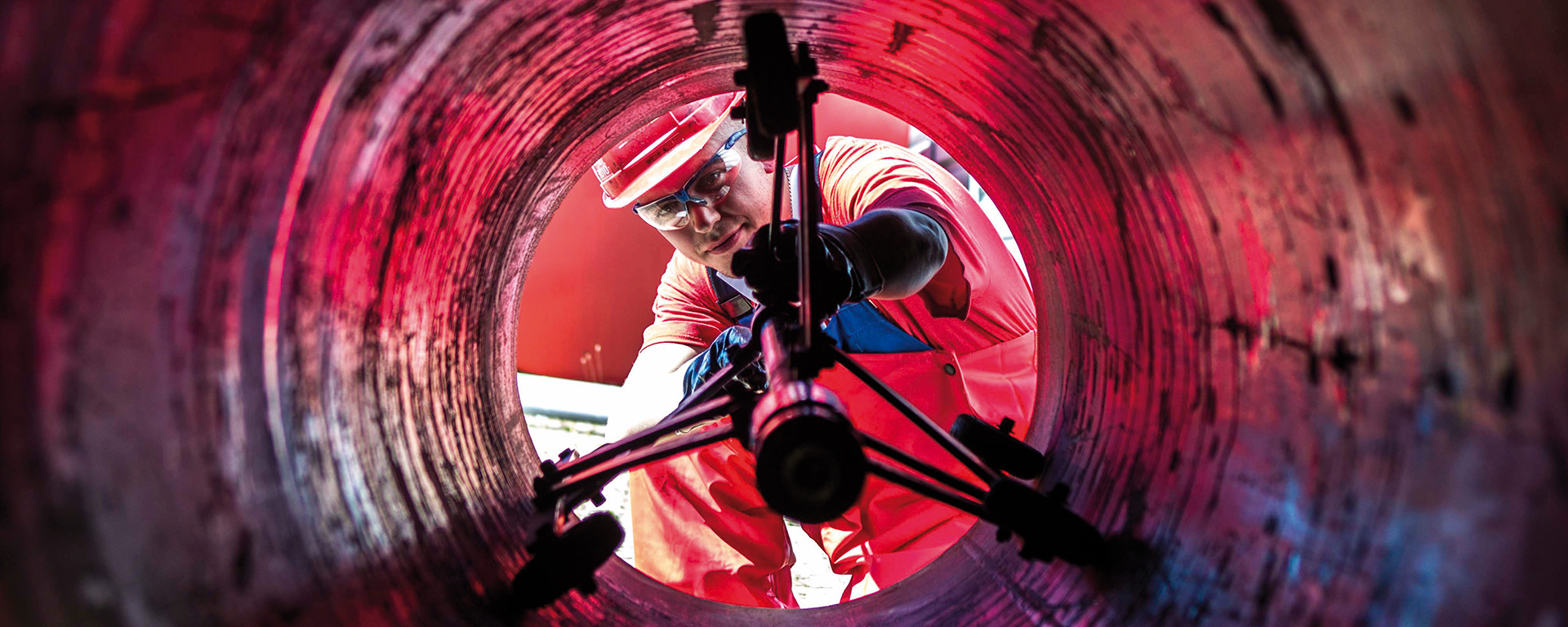Go to the DIRV’s website to find out more
Suche
Company locations
The whole picture – with just a single click. Find out here where our branches are located, what services they offer and how to contact them.
REMONDIS Group locations
Discover the world of REMONDIS with its approx. 900 branches and associated companies in over 30 countries across Europe, Africa, Asia and Australia.
DIRV calls for work safety to be further improved
Making industrial cleaning work even safer – this is the goal of the DIRV [German Industrial Cleaning Association]. This newly founded association unites the chemicals industry, industrial service providers and equipment manufacturers. BUCHEN UmweltService is one of the DIRV’s founding members. With good reason, as implementing wide-ranging, exemplary procedures to promote health and safety in the workplace is a central feature of its company policy – and something that is constantly being further developed with an extensive catalogue of measures. These range from relevant management systems, to a comprehensive QHSE organisation, all the way through to campaigns to grow safety awareness when carrying out everyday tasks. What’s more, BUCHEN also increases the safety levels of the technology and systems it deploys by developing its own innovations, particularly in the area of automation. Matthias Ebach, BUCHEN managing director and DIRV board member, explained: “When it comes to safety, BUCHEN uses every opportunity available to it to further increase standards. Becoming a member of the DIRV will open up new options and different approaches beyond our own initiatives and enable yet more progress to be made – something that will benefit both our employees and our customers.”

When it comes to safety, BUCHEN uses every opportunity available to it to further increase standards.
Matthias Ebach, BUCHEN managing director and DIRV board member
Setting shared standards
Dr Andreas Felske is Head of Waste Handling, Disposals and Industrial Services at BASF SE and Chair of DIRV’s Board. With extensive international experience and a particular focus on work safety, he is looking for the association to collaborate closely in this area. In the following interview, he discusses the initiatives, opportunities and goals of the association.

Dr Felske, safety obviously plays a key role in industrial cleaning work but does it really need a further association, i.e. the DIRV?
Absolutely. Up to now, for the most part, everyone has been working on this important subject by themselves. Organised events to exchange information about safety in this field are very rare indeed – either between companies and organisations or across national borders. The result has been a series of isolated solutions rather than universal standardised best practices. And this is what we want to change.
The DIRV has not been around for long. What prompted its foundation?
We were officially registered as an association in February 2021 but the DIRV began quite a bit earlier. A small group of chemical firms got together at the end of 2018 to discuss ways of improving health and safety in the area of industrial cleaning. This was the beginning of a series of regular meetings. It soon became clear, though, that it made more sense to involve the contractors as well. Then the equipment manufacturers were invited to join in followed by a group of organisations including the VDMA [German Mechanical and Plant Engineering Association], VAIS [Plant Technology and Industrial Services Association] and various employers’ liability insurance associations as well as the DGUV [German Social Accident Insurance]. What began as informal get-togethers has now become our association.
The DIRV’s primary goal is to make industrial cleaning work safer. What can the association actually do to achieve this?
Put simply, we provide a central platform that enables joint progress to be made. Whether it involves sharing best practice solutions or advancing the safety-oriented automation and mechanisation of equipment. And this really is the best possible approach. If industrial cleaning specialists are given technology that enables them to work from a distance then they are taken out of the line of fire so to speak. We also feel it is very important to further train the operatives.
But the companies already offer them further training courses.
Yes, that’s true but not all firms have such an excellent set-up as BUCHEN, which has its own training centre. On top of this, the various initiatives offered by the different companies lack a common thread which means it’s impossible to compare the individual results. This is what the DIRV wishes to work on, for example by developing further training modules and compiling a manual containing all the fundamentals. Our goal is to be able to offer a certificate that makes it possible to compare the qualifications of operatives as well as to assess their skills.
The DIRV organises workshops, roadshows, conferences, trade fairs, work group events and much more so that the different members can get together.
That’s not all though. Our association is also looking to promote cross-border interactions as well. We already have members based abroad, for example in the USA, Sweden, Belgium and the Netherlands. We feel it’s important to operate at an international level. At the end of the day, all countries face the same challenges. The DIRV can build up cross-connections and implement solutions that help other countries as well. And then there are a number of higher level tasks. We can, for example, spur on the efforts being made to draw up new laws and ordinances.
A wide range of tasks then. Which prompts the question: where do you see the DIRV in ten years’ time?
In ten years’ time? That’s a long way off. We want to be much quicker. I’m assuming that we’ll be offering the further training certificates for operatives within the next three to five years. Chemical firms can then name the DIRV certificate in their tender processes as a uniform standard and make the certification mandatory for the procurement procedure. Of course, there’ll need to be a transitional period so companies can meet this requirement. As far as the development of the equipment and the transfer of best practices are concerned, then this must and can happen faster. Thanks to the DIRV, the fundamental structures are in place for shared progress to be made. Now it’s a matter of uniting and filling them with life.
Some great words to end on. Dr Felske, many thanks for taking the time to talk to us. We wish you every success.



